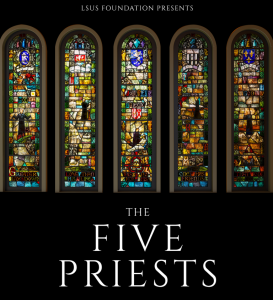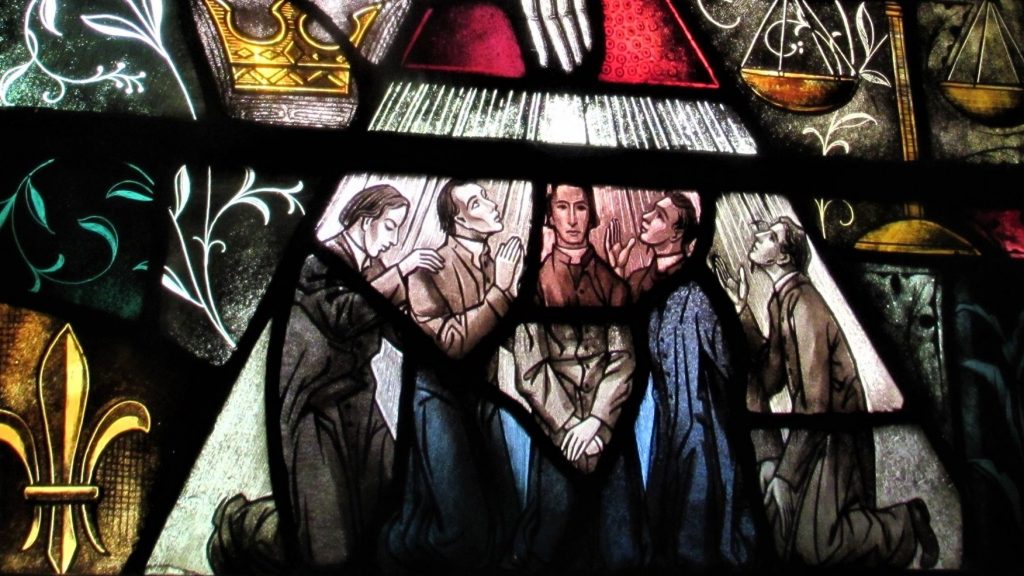Last January when Chris Charles Scott directed a documentary about five French priests that cared for the sick through the 1873 yellow fever epidemic in Shreveport, Louisiana, he never expected that it would have a spot in this year’s Cannes World Film Festival.
The expectation, Scott said, was a regional and Catholic audience. Although now that the documentary’s reach has extended far beyond those boundaries in both secular and sacred spaces, he recognizes the timing of its November premier was pivotal.
People identified with making a personal sacrifice in a pandemic situation.
“We were [filming] smack dab in the middle of our own pandemic and seeing how we are in hopefully the last stages of this disease; a lot of people’s priorities were realigned; a lot of people’s paths were reshaped and I think that’s why people resonate with this story,” Scott told Crux. “This is a timeless tale of what God’s people do when bad things happen.”
 The documentary, “The Five Priests,” is the culmination of years of work by three Shreveport Catholics to spread the story of the five priest’s sacrifice and get them on the path to sainthood. The five priests – Fathers Jean Pierre, Isidore A. Quémerais, Jean-Marie Biler, Louis Gergaud and François Le Vézouët – became Servants of God in December 2020.
The documentary, “The Five Priests,” is the culmination of years of work by three Shreveport Catholics to spread the story of the five priest’s sacrifice and get them on the path to sainthood. The five priests – Fathers Jean Pierre, Isidore A. Quémerais, Jean-Marie Biler, Louis Gergaud and François Le Vézouët – became Servants of God in December 2020.
As history tells it, between late August to mid-November of 1873 Shreveport lost a quarter of its population to yellow fever. The mosquito-borne disease causes fever, nausea, and muscle pains and can lead to liver and kidney failure.
While many people fled Shreveport for safety, Pierre and Quémerais, who were assigned to the northern Louisiana city, stayed to care for the victims. Biler, who was a chaplain at a local convent, also stayed in the city. Pierre and Quémerais contracted yellow fever and died. When Biler came down with the illness, he contacted Gergaud – a priest from a nearby town – who arrived in time to give Biler last rites. However, Gergaud, too, quickly succumbed to the virus. Hearing about the desperate situation, Le Vézouët then left Natchitoches – then the seat of the diocese – to travel to Shreveport and minister to the sick and dying. He also, quickly contracted the disease and died.
The five priests are all from Brittany, France. They were recruited to come to the United States by Bishop Auguste Marie Martin, the founding bishop of what is now the Diocese of Shreveport.
“It is a parallel with the conditions of the world today,” Cheryl White, history professor at Louisiana State University Shreveport told Crux. “Five priests who made a decision to lay down their lives in an epidemic for strangers, and here we are living in a global pandemic, trying to look for examples of human virtue.”
White has done extensive research of the priests over the past four years alongside Father Peter Mangum, the rector at the Cathedral of St. John Berchmans in Shreveport, and local historian Ryan Smith. Their research culminated in the documentary, and a book, Shreveport Martyrs of 1873: The Surest Path to Heaven, that was released in October 2021.
White received an email from Cannes with the news of the documentary’s official selection on Jan. 5. The festival takes place in May. It won best documentary feature in the Europe Film Festival. It’s a finalist in the Texas Film Festival. The Roma Prisma Independent Film Festival and the Christian Film Festival have also named the documentary an official selection.
“The most exciting part about it for me is not the creative aspect, but the fact that it affirms for me the universality of the story of these five priests,” White said.
Apostolic Nuncio to the United States Archbishop Christophe Pierre, Bishop Francis Malone of Shreveport and Mangum are the clergy featured in the documentary. Pierre, who wrote the foreword for the book, is from Brittany, France, and has long championed the five priests’ cause.
White and Smith are also featured in the documentary, as is Shreveport Mayor Adrian Perkins, a city native who sees an importance in sharing this story as a community leader in a difficult time.
“Everybody can take away the fact that during a pandemic, or during any crisis for that matter, we are so much stronger when we come together and think about others,” Perkins told Crux. “If we think about others, at the end of the day we’re all going to be so much better off.”
In a similar sense Scott said it was important for them to lean into the human suffering that took place during the 1873 yellow fever epidemic to really highlight the sacrifice the five priests made. Showing that dichotomy between the horror of the disease and the greatness of their sacrifice, he said, compelled people because deep down “we all have that capacity to serve.”
The next step for the five priests is to be declared Venerable after an investigation at the Vatican. It is the first sainthood cause from northern Louisiana. In the meantime, White, Mangum and Smith will continue sharing the story. They’re in the process of adding French subtitles to the documentary, which they’ll then share on a trip over there after Easter.
“I don’t know what comes next but I know it’ll be spectacular; it’ll be great,” Smith said. “I think this is going to carry on for some time, maybe intermittently, but it’s here to stay. These guys will be venerable I have no doubt about that.”

